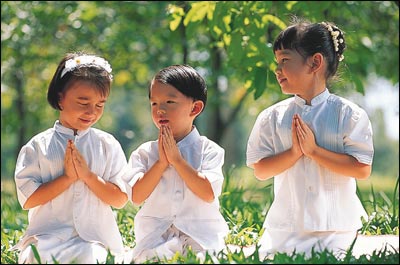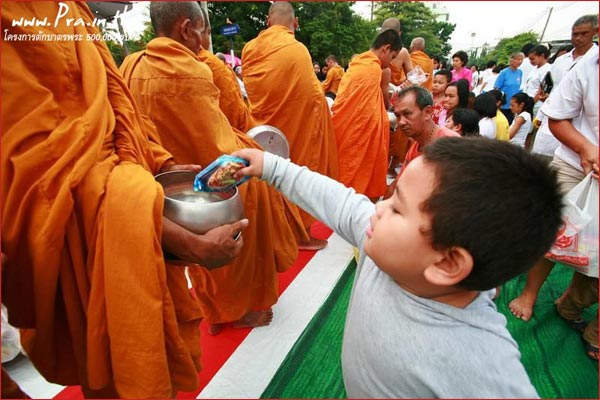MeditationMeditation for BeginnersHow To Build The Habits Of The ChildrenTo Be Sincere And Clever (Mai Ngo)#4The knowledge in Dhamma can help everybody to develop life in a good way.When You Respect The Dhamma You Are CleverAlso it will teach you to get rid of all kilesa (derangements and defilements). Then you will become an Arahant and go to Nibbana.The aim of all the instructions is to teach humans to get rid of kilesa in order to have no more suffering from birth, old age, sickness, and death (samsara).The Lord buddha’s dhamma can be used as the rule to measure right-wrong, good-bad, virtue-sin, proper-improper, and useful-useless in order to think, speak and perform good deeds confidently. It also develops all good habits in children later on.In previous lessons, we learned that the origin of childrens’ habits is to train them to repeat thinking, speaking and doing by parents.1) Repeat thinking, speaking and doing in the right way will develop good habits and train you to be a bad person.2) Repeat thinking, speaking and doing in the wrong way will bring bad habits and train you to be a bad person.It can be compared to installing computer programs. If we install good programs, it will be useful for us. If we put viruses into the computer, all the good data and the computer will be destroyed.So if parents install good programs for children, they will become good people. If parents install bad programs for them, they will become bad people.The important factor is how parents can be sure that the programs, which they will install for their children, will be the right, important and useful programs for them so they are thinking, speaking and doing the right lessons for the children. It should be right, good and useful. The rules that we will use to measure the good programs are more important than anything. In some eras, without the life of the Lord Buddha on earth, people understood that killing and robbing were good deeds. Then there were many criminals in the world.But later, the Lord Buddha taught people to get rid of all kilesa. Then people learned to judge good and bad deeds. This was the origin of the true teachings in the world.That’s why our grandparents keep on saying that everyone should learn the Dhamma before getting married in order to able to teach Dhamma correctly to their children in the future. The knowledge in Dhamma can help everybody to develop life in a good way.For example, they should be able to classify right, good and proper.Right is something that we don’t know whether it’s useful or not, but it becomes useful later on.Good is something that we know is right, and do it carefully until it’s done.Proper is something that is not good or bad, but doing it is better than not doing it.If children study and practice Dhamma well, they will be able to classify right, good and proper well, while there are many people who will never know and won’t be able to classify those for all of their lives.To train children to respect the Dhamma, our grandparents would teach children to pay respects to and pray to the Lord Buddha since they were really young. The grandparents taught the children from when they were very small. Then they will bring them to the temples when they grow up. When the monks teach the Dhamma lessons, children will memorize them and come back home to review. If there are any mistakes, grandparents will help to explain to them correctly. That will promote the children to develop Dhamma knowledge.If parent would like children to be good kids, they have to learn and understand the Dhamma correctly. Respecting and practicing the Dhamma is an important example for children to follow.Parents should teach children to pay respect to them. Parents might bless the children before going to bed by mentioning the good things of that day.For example, “Son, even though I was taken advantage of, I never lied to anyone. With my good, I’ll ask you to be a good child, the concentrate in class, to not take advantage of any one, and to not lie to anyone.”If parents often do that, the children will be obedient. They will be able to develop their good analysis, and classification of the right-wrong, good – bad, boon – kamma, and proper – improper.However, before blessing children, parents should learn the basic Dhamma rules, which are the truths of life and the world, called:Donating is good, we should do it.The 8 Factors of Samma – Dhitti.These Dhamma rules teach us to look at the basic realism of the world, while we are still in the cycle of birth, old age, sickness, and death, in order to avoid any mistakes in life. The 8 factors are:1) Donating is good, we should do it.2) Respecting respectful people, we should do it.3) Welcoming good people and talking with them, we should do it.4) Parents are great; we should be great in return.5) Doing well yields good, doing badly yields bad.6) Death is not the end where you disappear.7) Hell and heaven exist.8) Phra Arahants, who get rid of all kilesa, exist.These 8 factors of Samma-Dhitti will influence lives, which are still in the cycle of birth, old age, sickness, and death, as long as they exist.If parents still don’t understand any of these factors, they should try to learn them. Otherwise, we will be judged as people who don’t respect the good and the Dhamma. The chance to make a mistake in life will be increased as well as more chances to be sinful. That might impact the children’s habits as they focus on bad deeds of their parents.The 8 factors of Samma – Dhitti are the basis of life development. It shouldn’t be overlooked at all because in the future, it’ll have a huge impact on our lives and the next life. One day in the future when you will understand the 8 factors it will send tremendous it will send tremendous results directly to the parents. Especially when the parents dis, they will leave this world and be unable to predict the future. Children will go on to do Sanghadhana (prayer ceremony to send virtue or merits to deceased relatives and loved ones), doing virtue and giving the merits to the parents or not. It will depend upon their understanding of Samma –Dhitti. The children usually give the parents merits on the day of cremation but will they give merits in the future beyond the cremation day? This will depend on the children’s level of understanding the Dhamma.In summary, respecting the Dhamma will help parents to be able to classify the good – bad, right – wrong, virtuesin, and proper improper. Then parents can have wisdom, plant good habits for children properly, and also protect them from bad behaviors.Moreover, parents will have happy lives and good children in this life and the next life from the virtues, which are made from their children by offering Sanghadhana." /> " /> " /> " /> " /> " /> " /> " /> " />" /> " />" />
How To Build The Habits Of The Children To Be Sincere And Clever (Mai Ngo)#4
[ 8 ธ.ค. 2554 ] - [ 18264 ]







